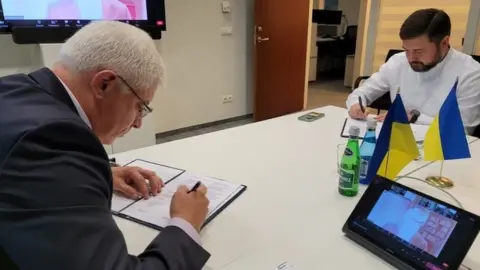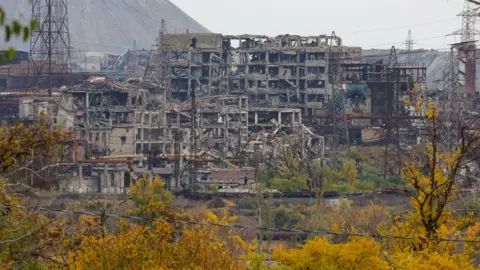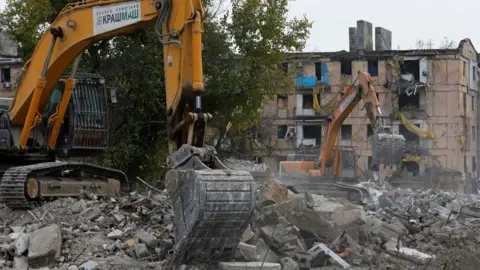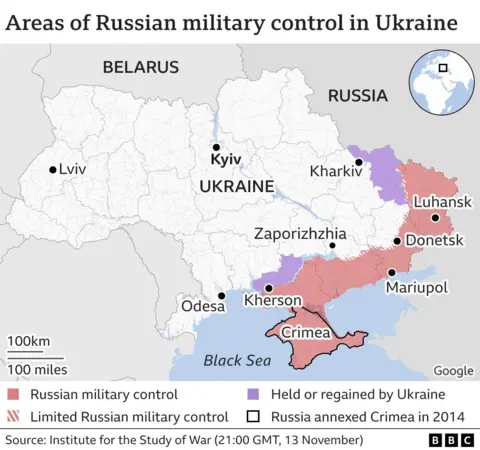Ukraine war: We will rebuild, vows mayor of flattened Mariupol
 Mariupol mayor’s office
Mariupol mayor’s office Vadym Boychenko is under no illusions. The Russians, says the mayor of Mariupol, will never leave the city voluntarily.
But the Ukrainian Army, he adds, will expel them.
In fact, he is so confident that day will come that he has just been in Poland signing a deal with the European Bank for Reconstruction and Development (EBRD) to rebuild his shattered city when the Russians depart.
Working together with the World Bank, a "Damage, Loss and Needs Assessment" report is being compiled to quantify the damage to water, sanitation, public transport and lighting. Once this is complete, it's intended to produce The Mariupol Revival Plan.
Mariupol will go down in history as one of the most heavily bombed, shelled and rocketed cities since World War Two.
For months, following Russia's invasion in February, a hard core of defenders held out, mostly in tunnels inside the grim, dystopian, Soviet-era Azovstal Iron and Steel Works, while much of the city around them was reduced to rubble. At least 20,000 people are estimated to have been killed in the siege.
"In two months," says Mayor Boychenko,"Russian troops inflicted more damage on Mariupol than German troops did in two years of occupation during World War Two.
"In fact, 90% of all city infrastructure has damage of varying severity. Eleven out of 15 hospitals have been destroyed, 39 out of 63 schools have been destroyed, 25 out of 79 kindergartens have been completely wiped out."
 Reuters
ReutersThe mayor, not surprisingly, is no longer in Mariupol where the Russian army is in full control.
He is now based in Zaporizhzhia, a city still in Ukrainian hands - yet the capital of a province illegally annexed by President Putin as "a part of the Russian Federation for ever".
This summer the Russian army released a video showing their military engineers rebuilding parts of Mariupol. So is the new Mariupol Revival Plan being done in coordination with the Russians?
Mayor Boychenko is quite emphatic on this point. "It is out of the question. We do not conduct any dialogue with the terrorists who destroyed our city and killed tens of thousands of Mariupol residents. Russian occupiers are a terrible but temporary phenomenon."
 Reuters
ReutersThe Russians today are firmly dug in in Mariupol. And, having fought so long and hard to subdue this strategic city that stands between occupied Crimea and the eastern Donbas region of Ukraine, they are unlikely to give it up easily.
By next spring, tens of thousands more mobilised Russian troops are expected to join the Russian war effort. Yet Mayor Boychenko is taking heart from the recent liberation of Kherson.
"We expect further progress in the southern direction," he says. "The military has already said the Russians will be expelled from our land approximately next spring. I believe in the Ukrainian Armed Forces, I believe in my son, who serves and defends our country today."
Could Mariupol, I ask him, one day become a great city again? "Yes, definitely", he says.
"There have already been examples in world history when cities were reborn from the ashes of war. For example, Warsaw, Gdansk, Rotterdam, Dresden.
"With support from partners like the EBRD, the World Bank and USAID there is no doubt that Mariupol will revive and will not only return to greatness, but will become even stronger."
 BBC News
BBC News